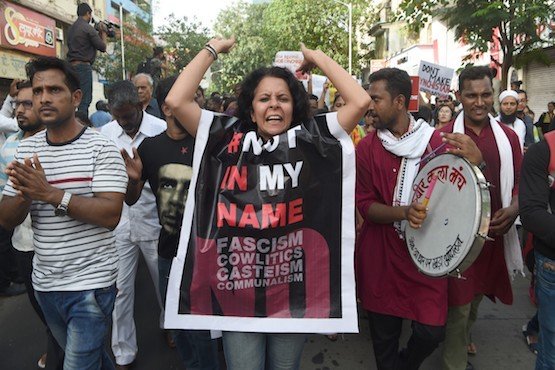Critical time in history for Muslims and Christians in India
India's critical time in history Muslims and Christians have a vital role to play in helping guard against excessive religious and cultural nationalism India's critical time in history

Indian demonstrators take part in a protest against a spate of murders targeting minorities under the pretext of protecting cows in Mumbai on July 3.
India, as a nation, goes through a critical time in history when its religious minorities are badly needed by its majority community — the Hindus. The major religious minorities — Muslims and Christians — have a vital role to play in helping guard against excessive religious and cultural nationalism.
In the context of Hindu majoritarian nationalism, more important than religion and culture is its ideology. It was an ideology, not religion or culture, that motivated the 1948 assassination of Mahatma Gandhi, father of India's independence. No one then blamed the majority religion or Indian culture for the crime.
The same ideology contributed to post-independence sectarian violence. And, in more recent years, the mindset motivated atrocities against Muslims, Christians, Dalits and Tribal people. It is this ideology, which asserts a narrow sectarian view, continues to push for a majoritarian cultural nationalism.
The real battle of Hindus versus Hindus
The main battle over cultural nationalism is within the majority Hindu community. It is fought between majoritarian Hindus and secular Hindus, who adhere to the nation's constitution and stress the plurality of cultures in India.
As in the case of Islamic terrorism, Hindu nationalism has little if anything to do with the Hindu religion or culture. Rather ideology is misrepresented as a fervent upholding of religious belief. Such majoritarian-ism violates human values. Pluralist secularism and minority rights are indeed universal.
In the 2014 national elections, Prime Minister Narendra Modi's Bharatiya Janata Party ( BJP) came to power after polling only 31 percent of the 67 percent voter turnout. That is barely 21 percent of eligible voters, certainly no clear mandate to implement sectarian-based politics based on Hindu primacy.
Many Hindus look for independent and unbiased arbiters to stand up against "majoritarian" excesses purportedly pursued on their behalf. The minority communities can help fulfill this important but sensitive role. There is a special need for Christians, Muslims and others to stand up for secularism, the nation's composite culture, and minority rights.
The unsoundness of Hindu nationalism can often not be easily discerned by members of the majority community without the assistance of the minority communities, especially their leaders and representatives. This is vital in a constitutional democracy like India's. Constitutional provisions to protect all segments of society must be upheld.
The role of religious minorities
It is also our duty to value and preserve the rich heritage of our composite culture. The majority might at first not feel all of the negative impacts of religious or cultural nationalism. Minorities alone may be at the receiving end initially, but such a cancer can spread to all communities.
Similarly, members of a minority are in a better position than members of the majority, to empathize with the suffering of other minorities.
Exercising minority freedoms is necessary to combat excessive nationalist indoctrination by fanatics. Ultimately, India's hard-earned independence as a nation-state can be put at risk by complacency.
Fundamental rights center on the freedom to assemble and to form representative organizations. However, misuse of such rights can have negative impacts, not least dis-empowering and demoralizing pluralists and constitutionalists.
In a constitutional democracy, no one can presume that elected governments, or holders of constitutional office, will always uphold constitutional principles. Even electoral approval does not necessarily imply correctness or constitutionality. In short, a democracy can go off the rails unless it sticks to constitutional ideals and values.
In the end, the electorate is not supreme, the constitution is. A policy implemented apparently in the interest of the majority, and supported by them, might not be correct or constitutional. The majority needs the minorities to hold up a mirror, reflecting what is good as well as dangerous "majoritarian" impositions.
M.P. Raju is a constitutional expert and lawyer in the Supreme Court of India. He lives and works in New Delhi.


 Votes : 0
Votes : 0









